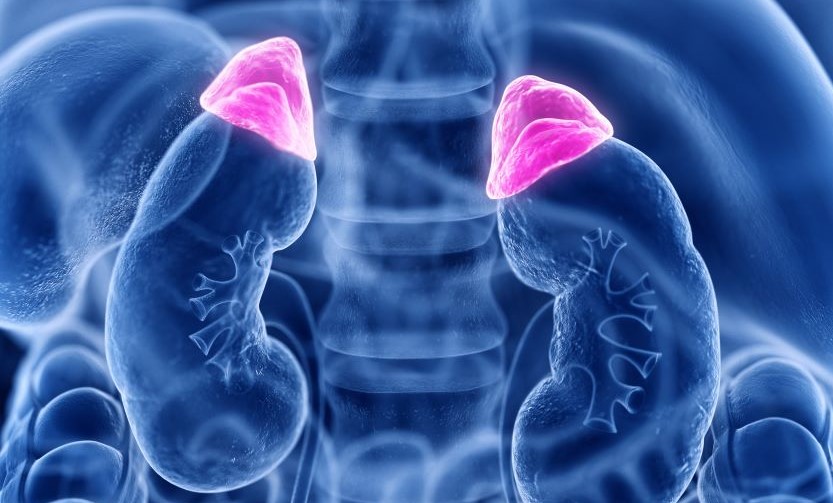Adrenal Glands

When you think of the adrenal glands you likely think of stress. It makes sense, since they are most often referred to for their role in secreting the hormone adrenaline (epinephrine), which enables your body to respond to a stressful situation. Think fight or flight reaction.
But that’s not really their primary role. Their primary role is in secreting hormones that are essential to life.
Each adrenal gland is composed of two distinct structures—the outer part of the adrenal glands is called the adrenal cortex. The inner region is known as the adrenal medulla.
The adrenal cortex secretes 3 types of hormones that are essential for life – mineralcorticoids, which are regulated by the hypothalamus and pituitary glands in the brain; glucocorticoids that are regulated by signals from the kidneys; and sex hormones to a small degree (most sex hormones are produced by the ovaries and testes).
Glucocorticoids released by the adrenal cortex include:
- Hydrocortisone: Commonly known as cortisol, it regulates how the body converts fats, proteins, and carbohydrates to energy. It also helps regulate blood pressure and cardiovascular function.
- Corticosterone: This hormone works with hydrocortisone to regulate immune response and suppress inflammatory reactions.
The principle mineralcorticoid is aldosterone, which maintains the right balance of salt and water while helping control blood pressure.
Unlike the adrenal cortex, the adrenal medulla does not secrete hormones that are essential to life, but that does not mean they aren’t beneficial. Hormones secreted by the adrenal medulla help you deal with both physical and emotional stress.
Hormones secreted by the adrenal medulla are:
- Epinephrine (adrenaline): This hormone rapidly responds to stress by increasing your heart rate and rushing blood to the muscles and brain. It also spikes your blood sugar level by helping convert glycogen to glucose in the liver.
- Norepinephrine (noradrenaline): This hormone works with epinephrine in responding to stress. However, it can cause vasoconstriction (the narrowing of blood vessels). This results in high blood pressure.
Disorders and diseases of the adrenal glands include Addison’s disease (also known as adrenal insufficiency), which develops when the adrenal cortex fails to produce enough cortisol and aldosterone, and Cushing’s disease, which is caused by overproduction of the hormone cortisol, typically due to a tumor on the adrenals or pituitary gland.
Adrenal fatigue is a term applied to a collection of nonspecific symptoms, such as body aches, fatigue, nervousness, sleep disturbances and digestive problems. Although the term is commonly used, it isn’t an accepted medical diagnosis currently. “Adrenal Fatigue” is a syndrome, not a disease, which means it is a collection of symptoms. Symptoms of adrenal fatigue syndrome are numerous and include:
- Waking up unrested
- Decrease ability to handle stress
- Brain fog or decreased cognitive ability
- Dizziness when standing from sitting or lying down
- Low sex drive
- Increased severity of allergic responses
- Low blood pressure
- Low blood sugar
- Weakness, and more…
Adrenal disorders such as Addison’s and Cushing’s diseases are medical conditions that require medical treatment, or life-long hormone replacement (much like type 1 diabetes or hypothyroidism).
Adrenal “fatigue” can best be addressed by a healthy diet (high glycemic diets and overconsumption of stimulants are often problematic), adequate sleep, stress management, and a balanced multivitamin/ mineral supplement that provides basic building blocks and nutrients to support normal kidney and adrenal function. Specific products marketed to treat adrenal fatigue are rarely necessary or beneficial, especially if lifestyle and dietary factors are not adequately addressed.
https://www.endocrineweb.com/endocrinology/overview-adrenal-glands


